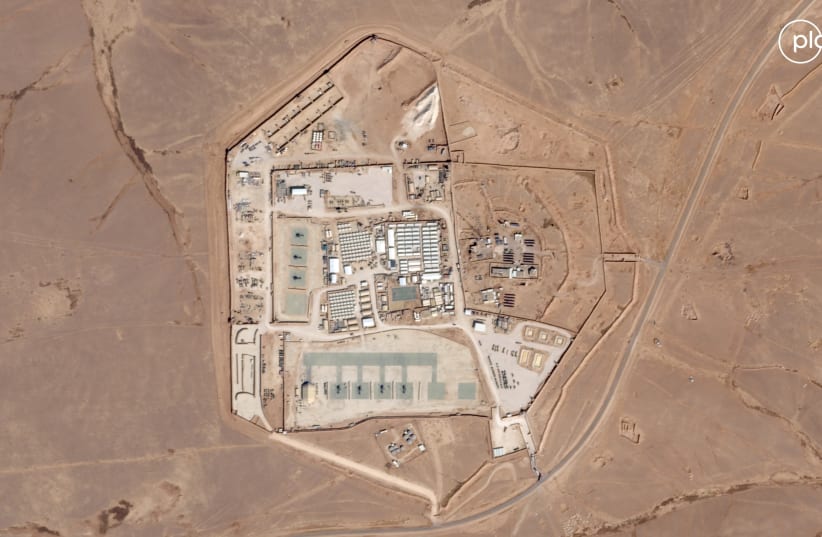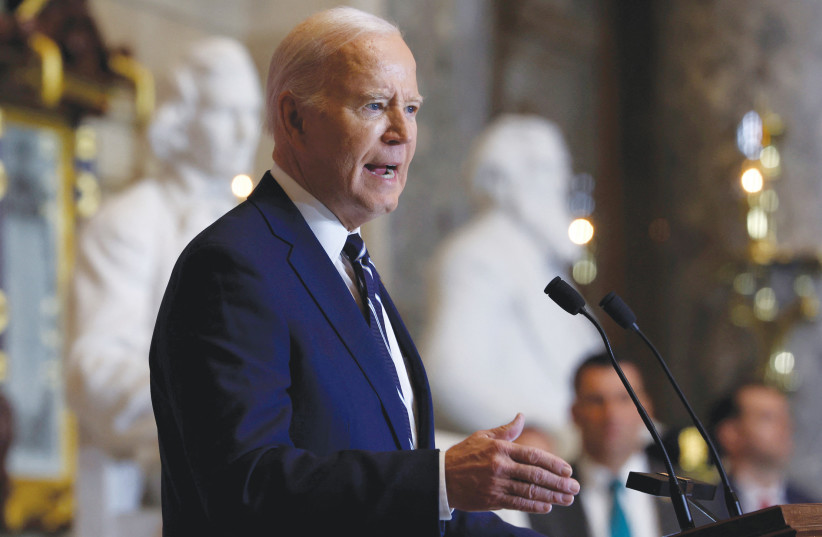The fruit of Tehran’s strategy is evident in the recently announced US plan to pull all its remaining troops from Iraq.
FARHAD REZAEI FEBRUARY 5, 2024 01:08

Satellite view of the US military outpost known as Tower 22, in Rukban, Rwaished District, Jordan October 12, 2023 in this handout image.(photo credit: Planet Labs PBC/Handout via REUTERS)For the past two months, Iranian proxies have attacked American forces in Syria and Iraq more than 170 times. Although Washington has hit back at the militias, the Biden administration is resolved to evacuate its few remaining bases in the region.
In the latest operation, elite Iraqi armed faction Kataib Hezbollah, a member of the pro-Iranian Hashd Shaabi (Popular Mobilization Force) killed three and wounded 47 American troops stationed in Tower 22 in Jordan – a country that was previously spared such attacks.
The wave of attacks is worrisome. There are approximately American 900 soldiers (and hundreds of contractors) stationed in Syria’s northeastern provinces of Hasakah and Raqqa – as well as on al-Tanf US military base, in a remote but strategically important area of Syria, near the borders of Syria, Jordan, and Iraq. They conduct counterterrorism operations against ISIS with the objective of preventing the resurgence of the group in areas that have been liberated from its control.
Moreover, as outlined in a 2019 Congress-funded report, the key US national security interest in Syria is to defend the rules-based international system (RBIS) in that country and to maintain pressure on Iran, lest it build up its strategic capabilities. To this end, the presence of US forces is important to cut Iran’s military and smuggling supply lines from Iraq to Syria and Lebanon; to assist Kurds who have been playing a significant role in helping the US forces fighting the Islamic State (ISIS), and to limit the influence of Iran and Russia.
In Iraq, there are some 2,500 troops, located in several bases, including al-Asad Airbase in Anbar Province, and al-Harir Airbase in Erbil, in Kurdish Region. They help fight the numerous ISIS cells and train the Iraqi forces in counter-terror operations. The American contingent in Iraq also supports its troops in Syria, who, along with the Kurds, continue to carry out ground operations against the remainders of ISIS. Those who were killed in Jordan were part of 3,000 US Army personnel stationed around the country to protect its borders and interdict the pro-Iranian militias’ drug traffic.
If Tehran hopes for a second Biden term, why complicate his election strategy with high-profile attacks?
The attacks raised an interesting question about the motivation of the regime known to favor the weak US president, referred to by his Persian nickname Kiseh Boks (“Punching Bag”): If Tehran hopes for a second Biden term, why complicate his election strategy by the high-profile attacks?

US PRESIDENT Joe Biden speaks at the annual National Prayer Breakfast at the Capitol last week. The harassment of US forces seems to be related to the Iranian regime’s view that Biden’s reelection odds are slim and that soon they’ll have to face Donald Trump, the writer maintains. (credit: EVELYN HOCKSTEIN/REUTERS)
Some commentators have suggested that the militias are acting on their own, as they compete for power and prestige. This is highly unlikely because al-Quds Force, the expeditionary division of the Islamic Revolutionary Guards Corps (IRGC) exerts tight control over its proxies. Rather, the harassment of US forces seems to be related to the regime’s view that Biden’s reelection odds are so slim that they would have to face Donald Trump, the much-feared mercurial president who ordered the killing of their national hero, Qassem Suleimani.
To this end, a decision was made to increase pressure on Biden to withdraw US military personnel before a change of guard in the White House. According to Iran’s calculations, Biden is too overburdened with the war in Gaza and the Houthi attacks to retaliate for the current campaign against American troops.
The Israel-Hamas war in Gaza has created grave problems for Washington, exceeded only by the Houthi disruption of a key maritime trade route in the Red Sea, that accounts for some 15% of global trade. Many shipping companies have rerouted around the Cape of Good Hope, causing considerable delays and additional expenses in a global economy still struggling to recover from the COVID-19 pandemic.
So far, Tehran seems to be justified in its analysis.
Replying to a question of how the United States would respond to the attacks, Chairman of the Joint Chiefs of Staff Gen. Charles Brown warned against broadening the conflict. His boss, Secretary of Defense Gen. Lloyd Austin, sounded an equally cautious note. Iranian-affiliated media were gleeful, all the more so when it became clear that the administration would not react to the unprecedented assault in Jordan. In one cartoon Biden is depicted as “the region’s punching bag.”
The fruit of Tehran’s strategy is also evident in the recently-announced US plan to pull all its remaining troops from Iraq. According to a 2021 agreement with Baghdad, while the American military mission was officially terminated, the contingent left behind performs vital security tasks. Leaving Syria would seriously jeopardize the hard-won gains made against ISIS and endanger the Kurds.
Counterterrorism experts estimate that the terror group still has 8,000-16,000 guerrilla fighters operating in Iraq and Syria. Moreover, if the IRGC takes the strategically critical Tanf US base, a contiguity would be created between Iran, Iraq, and Syria. The Iranian leaders believe that if the American troops leave, the prospective Trump administration would lack an excuse to bring them back. Indeed, the campaign to push all the remaining troops out would give Iran uncontested dominance over a strategic swathe of the Middle East.
The writer is a senior fellow at the Philos Project.
Content retrieved from: https://www.jpost.com/opinion/article-785136.